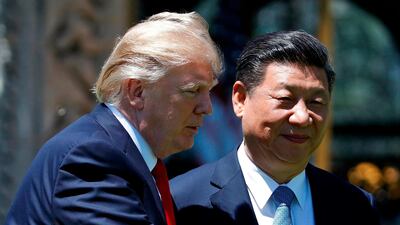Wherever you may have been in the US, Europe or the Middle East this past week, you likely felt the headlines were dominated by regional news: a battle over a Supreme Court confirmation in Washington, the tug of war over Brexit in the UK, worsening situations in Iran, Syria and for the Palestinians. But, in geopolitical terms, all of these pale in contrast to the pronounced souring of the relationship between the world's most important established power, the US, and its most important emerging power and largest nation, China.
In the course of a single week, we saw a dangerous near confrontation between US and Chinese naval vessels in the South China Sea. We saw the Chinese cancel a planned security meeting with the US defence secretary in Beijing. We heard the chief economic advisor to President Donald Trump tell a collected group of DC movers and shakers that the principal target of the US's recent onslaught of tariffs worldwide is China, and that we could expect pressure on the Chinese to ratchet up.
We then had Vice President Mike Pence giving a speech arguing that China is now the country the US really had to watch when it comes to interference in American elections. Mr Pence asserted that Beijing did not like Mr Trump, ostensibly because of his hawkish views on trade, and that it was using covert and overt means to tip the scales in the upcoming midterm elections.
No matter that Mr Pence’s assertions were not backed up by credible evidence. The examples he gave were weak − notably his claim that the Chinese are nefariously seeking to influence voters by putting tariffs on goods from states and regions that are politically important to the Republican party, so that those voters will turn against Mr Trump’s trade policies. The accusation was seen as a feeble one by trade experts who note that this is how countries always retaliate in trade wars. Another example cited was that the Chinese ran advertorials in the local Iowa press − again something that many nations have done and continue to do to get their message to the American people. It also did not help Mr Pence’s case that, the day before his speech, Secretary of Homeland Security Kristjen Nielsen had said that China was, in fact, not interfering in the elections.
In part, Mr Pence was raising the China issue as a way to deflect attention from the ongoing investigation into Russia’s efforts to help Mr Trump win the 2016 US presidential elections. By saying China was going after Mr Trump, he was seeking to create an equivalency between the two countries that would offset one another. Of course, with no evidence to back up the allegations, that element of the ploy was seen for what it was: pure political gamesmanship.
On the other hand, the Pence speech − taken with the week’s other developments, and increasingly harsh rhetoric from Mr Trump about China, including a recent reference to his relationship with China’s President, Xi Jinping, asserting that perhaps the two men were no longer “friends” − is ominous in terms of the future of this vital relationship.
We have also recently heard speeches and seen efforts seeking to target Chinese students in the US. Fewer visas are now being granted to such students, and China has been accused of seeking to use the large number of its citizens studying in the US to extend its influence into America.
Late last week, the Pentagon also issued a report indicating that US defence contractors were now being put at risk, owing to the ability of the Chinese to corner the market on certain sensitive products and technologies.
In the 2016 presidential campaign, Mr Trump targeted China. As America faces important midterm elections in less than a month and Mr Trump faces a re-election bid in less than two years, many Washington experts expect the rhetoric regarding China to worsen in the foreseeable future.
The trade conflict between the two countries is likely to be the focus of much of that tension, given that it is popular with many in the Republican Party − even if it also is squeezing key constituencies such as farmers, as their products are no longer being welcomed into China, and the Chinese are seeking alternative sources for them. But it would be wrong to rule out further tension around China's disputed control of islands in the South and East China Seas, the strengthening of its military forces and, in particular, its blue-water naval assets, and even the possibility of increasing belligerence from both sides around the issue of Taiwan.
In other words, try as Russia might to rekindle the old Cold War, there is a new global superpower confrontation brewing. The consequences for the world are great, especially as the US and China increasingly see themselves as rivals for influence in different regions. It would be dangerous indeed if either or both sides began to view relations with other countries as a zero-sum game, with the other’s gains being perceived as losses for their rival.
The posture of the US and the increasing resistance of the Chinese to American pressure should therefore be seen as disturbing trends that the rest of the planet must hope to see reversed, one way or another. The alternative could be extremely destabilising for many key regions of the world that depend upon and seek strong relations with both sides.
David Rothkopf is CEO of The Rothkopf Group, a visiting scholar at the Carnegie Endowment for International Peace and author of The Great Questions of Tomorrow

